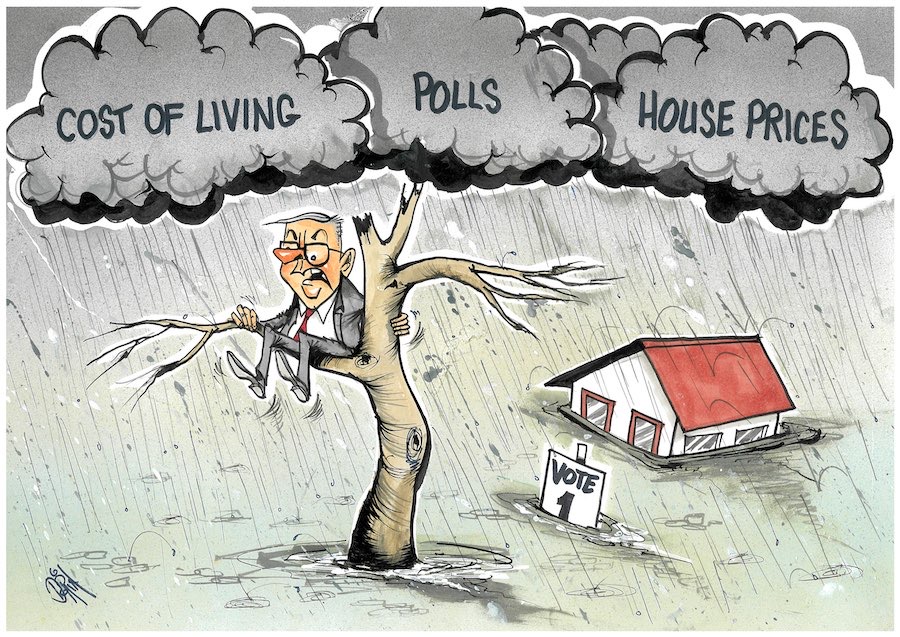
“Inadequate funding leads to inadequate preparation and piss-poor performance. That’s a disaster for the accused.” Legal columnist HUGH SELBY puts the moral and financial case for why the ACT needs a Public Defenders Office or increased Legal Aid funding, or both.
Here are some news headlines that you will never see, even though there are interesting stories behind them:
-

Hugh Selby. “Experienced, competent barrister working for a client who is getting ACT legal aid, too little to cover fixed monthly outgoings. Seeks second job as fully qualified tradie to put food on the table”;
- “Apprentice paying board to single parent living in poorly maintained ACT public housing, travelling to and from variable hours shift work by public transport, denied legal aid for alleged rape of girlfriend because he had been saving to get driving lessons and buy a second hand car”;
- “Defence barrister on legal aid rates in 2024 must spend days on preparation that were unknown in the past. These days they must read thousands of text messages, look at many hours of recorded police interviews with the complainant and with her/his client, listen to police managed entrapment phone call by complainant to unsuspecting suspect (now client), review any CCTV and police body camera footage, interview client several times, prepare pre-trial and trial strategy for a trial that will run for several weeks. Hourly rate is pitiful”.
Those unseen headlines explain this unseen headline (which I could have written about in awful detail from an interstate criminal case):
- “Barrister on legal aid rates gets cleanskin client who has been remanded in prison for over a year to plead guilty to sexual assault offence and be sentenced to ‘time served in jail’, despite the DNA evidence exonerating his client. Not concerned that this client now has a wrongful criminal conviction for a serious sexual offence that will dog him all his working life”.
The inevitable result of paying too little for too much is that the necessary work isn’t done, the fees are attractive only to those solicitors and barristers for whom throughput and quick invoicing, not quality, is important, and people are convicted when they should have been acquitted.
What makes the headlines for the Legal Aid crisis? Here is the “exciting” headline from this week in Canberra: “Convicted child sex offender hired by [Legal Aid Office]”.
You get what you pay for
In 2024 a barrister appearing in the ACT Supreme Court at a defended criminal trial will receive $2210 to cover trial preparation and the first day of trial, and $1380 for every additional day. That’s $830 for all the preparation (see here).
In 2012, the fee was $1920 to cover trial preparation and the first day of trial, then $1200 for each subsequent day.
Using the Reserve Bank’s inflation calculator, just to keep pace with inflation, it would have been necessary last year ( the last date for which the calculator works) to pay for the preparation and first day $2555, that’s $345 more than is now being paid.
As for the second and following day rate, the 2012 $1200 should have gone up by 2023 to $1597, that’s near a $220 daily shortfall.
With inflation both those shortfalls have increased in 2024.
Suppose, hypothetically, an experienced and competent criminal defence barrister chose to take only ACT Legal Aid briefs. Assume (and understating the days of unpaid preparation) that they are in court for three weeks each month and earning – for paid preparation and performance – in each week $7700 (one day at the preparation and appear rate, the other four at the later, lesser rate).
The other week of the month they are in unpaid preparation. They are also in unpaid preparation for at least some of the weekends. Their gross annual income (based on 10.5 months, because the Supreme Court closes down for part of December and all of January) will be $243,000 (based on monthly $23,100 for 10.5 months)
However, from that must be deducted unavoidable fixed costs. These include office space and support charges, professional memberships, indemnity insurance, compulsory continuing education, IT charges, account keeping, law book purchases, and subscriptions to necessary legal services. Allow an underestimate of $50,000.
That means the civic-minded criminal law defence specialist here in the ACT has a taxable income of around $193,000 at best. This is because for various reasons trials do not start when scheduled, clients choose to enter a late plea of guilty so that there is either no trial or a much shortened one, or trials are unexpectedly stopped because the jury has to be discharged. Hence to be realistic assume that the taxable income is around $165,000 (which is probably being too generous).
It’s fair and useful to compare that salary with that of their prosecutor opponent at the other end of the bar table in the courtroom. The Fair Work Commission’s latest determination for 2023 to 2026 covers the five grades of prosecutors. Taking the top of grade 3 (that is an experienced prosecutor who can competently run a jury trial) the salary now is just under $160,000 (which does not take account of all the leave and superannuation benefits that the prosecutor gets but the self-employed barrister must self-fund).
NSW has a Public Defenders Office that is independent of NSW Legal Aid. The public defenders are salaried advocates, like prosecutors, but they receive their work from the Legal Aid office. They include first-rate advocates for both trials and appeals, so good that both District Court and Supreme Court judges are appointed from its members. (One of our present Supreme Court Judges was previously a NSW Public Defender.)
As of July 2023 a NSW Public Defender and a NSW Crown Prosecutor are paid $314,000 plus up to an additional $18,000 for transport costs. (That’s close to twice what the take-all-the-risk hypothetical barrister here in Canberra is earning.) All their fixed costs are met by the government, along with the usual superannuation, sick leave, annual holidays, long service leave et cetera to which employees are entitled.
Values and priorities
Consequently, whether we approach the issue of providing adequate legal representation in criminal matters to the “have nots” in our community from a perspective of “keeping up with inflation”, or what is being done in NSW, successive ACT Labor governments have failed and are failing to adequately fund the necessary services. That failure is not trivial, nor is it excusable.
In mid 2016 the Law Council of Australia, the peak body for Australian lawyers, reported that: “Access to justice is a basic human right and it is one that Australians rightly feel entitled to. Legal representation should not be exclusively for those wealthy enough to afford it. …”
Eight years on, the situation has not improved.
Because the funding is so poor barristers will accept the work for these reasons: so inexperienced and/or inept that all experience, no matter how badly funded, is welcome; as a “fill in” when there’s a lull in better-paid work; and, because someone has to do it. This doesn’t mean they have to like it.
Inadequate funding leads to inadequate preparation and piss-poor performance.
That’s a disaster for the accused. It also means that poor police and prosecution practices are not brought to account, that there are avoidable inefficiencies in trials, and that we, the community, are not well served.
In 2019 Wayne Swan launched the book Story of Our Country: Labor’s Vision for Australia”. He finished his speech with: “We are anchored in the lives of ordinary people rather than privileged elites.”
That is a simple message for our elected pollies. All they need to do is to tackle this problem now: increase the funding, set up an ACT Public Defenders Office, or both.
When that happens there can be this headline: “For the cost of a few metres of light rail ACT Labor has put the pursuit of justice back on track”.
Hugh Selby, a former barrister, is the CityNews legal affairs commentator. His free podcasts on “Witness Essentials” and “Advocacy in court: preparation and performance” can be heard on the best known podcast sites.
Who can be trusted?
In a world of spin and confusion, there’s never been a more important time to support independent journalism in Canberra.
If you trust our work online and want to enforce the power of independent voices, I invite you to make a small contribution.
Every dollar of support is invested back into our journalism to help keep citynews.com.au strong and free.
Thank you,
Ian Meikle, editor









Leave a Reply